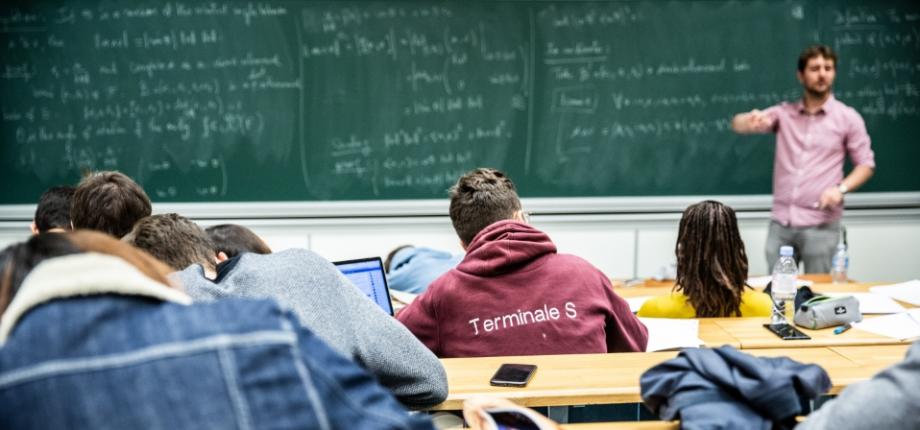Master Year 2 Mathematics, Vision, Learning

| Year | Master Year 2 |
| Program | Mathematics, Vision, Learning |
| ECTS Credits | 60 |
| Language | English and French |
| Orientation | Industry and Research |
| Location | mostly ENS Paris Saclay, also Palaiseau Campus, ENS Ulm, Centrale |
| Course duration | 12 months, full time |
| Course start | September |
| Degree awarded | Master’s degree |
WHY ENROLL IN THIS PROGRAM?
Asset n° 1
Follow a wide range of mathematics courses rooted in applied fields
Asset n°2
Become an expert in the highly sought-after fields of numerical data acquisition, processing and automatic interpretation
Asset n°3
Pursue a career in research or SMEs and innovative startups in the digital world
As more and more numerical data is used in science, technology and society, there is a growing need for top-level researchers in mathematics with expertise in numerical data acquisition, processing and automatic interpretation. The Mathematics, Vision and Learning Year 2 Master brings together these skills and knowledge with the aim of training tomorrow’s experts.
The courses offered are driven by data and problems from the real world focusing on scientific fields and industrial and medical applications. Many mathematical topics are also covered including signal representation techniques, variational methods and partial differential equations in image analysis, compressed sensing, probability learning theory, random matrices, convex optimization, theory of shape space, kernel learning methods, graphic models, Markovian simulation learning, control theory and reinforcement learning.
Objectives
This program enables students to:
- Discover a wide range of concepts, models and algorithms
- Undertake research topics at the numerical interface of mathematics
- Learn about all aspects of an applied research project including validating methodologies and algorithms via numerical experiments on real data
- The main openings for MVL graduates are in applied research with large research bodies (CNRS, CEA, CNES, INRIA, INRA, INSERM, etc.) or the R&D centers of big companies like SAFRAN, General Electric, Technicolor, Saint-Gobain, SAGEM, Dassault Systèmes, Xerox
- Most students engage in a PhD program either in an industrial or academic laboratory
- In recent years, SMEs and innovative startups in the digital world, in France and abroad, are increasingly looking for this kind of profile
Admission requirements
Academic prerequisites
- Completion of the first year of Master in mathematics at Institut Polytechnique de Paris or equivalent in France or abroad
- Motivated computer scientists with a very good level in mathematics will also be considered
Language prerequisites
- English
- French
How to apply
Applications can be submitted exclusively online. You will need to provide the following documents:
- Transcript
- Two academic references (added online directly by your referees)
- CV/resume
- Statement of purpose
You will receive an answer in your candidate space within 2 months of the closing date for the application session.
Fees and scholarships
Registration fees are available here
Find out more about scholarships
The Fondation Mathématique Jacques Hadamard (FMJH) offers Sophie Germain excellence scholarships to support students in Master's or PhD programs within its network, including the Institut Polytechnique de Paris. Find more information here.
Please note that fees and scholarships may change for the following year.
Applications and admission dates
As more and more numerical data is used in science, technology and society, there is a growing need for top-level researchers in mathematics with expertise in numerical data acquisition, processing and automatic interpretation. The Mathematics, Vision and Learning Year 2 Master brings together these skills and knowledge with the aim of training tomorrow’s experts.
The courses offered are driven by data and problems from the real world focusing on scientific fields and industrial and medical applications. Many mathematical topics are also covered including signal representation techniques, variational methods and partial differential equations in image analysis, compressed sensing, probability learning theory, random matrices, convex optimization, theory of shape space, kernel learning methods, graphic models, Markovian simulation learning, control theory and reinforcement learning.
Objectives
This program enables students to:
- Discover a wide range of concepts, models and algorithms
- Undertake research topics at the numerical interface of mathematics
- Learn about all aspects of an applied research project including validating methodologies and algorithms via numerical experiments on real data
- The main openings for MVL graduates are in applied research with large research bodies (CNRS, CEA, CNES, INRIA, INRA, INSERM, etc.) or the R&D centers of big companies like SAFRAN, General Electric, Technicolor, Saint-Gobain, SAGEM, Dassault Systèmes, Xerox
- Most students engage in a PhD program either in an industrial or academic laboratory
- In recent years, SMEs and innovative startups in the digital world, in France and abroad, are increasingly looking for this kind of profile
Admission requirements
Academic prerequisites
- Completion of the first year of Master in mathematics at Institut Polytechnique de Paris or equivalent in France or abroad
- Motivated computer scientists with a very good level in mathematics will also be considered
Language prerequisites
- English
- French
How to apply
Applications can be submitted exclusively online. You will need to provide the following documents:
- Transcript
- Two academic references (added online directly by your referees)
- CV/resume
- Statement of purpose
You will receive an answer in your candidate space within 2 months of the closing date for the application session.
Fees and scholarships
Registration fees are available here
Find out more about scholarships
The Fondation Mathématique Jacques Hadamard (FMJH) offers Sophie Germain excellence scholarships to support students in Master's or PhD programs within its network, including the Institut Polytechnique de Paris. Find more information here.
Please note that fees and scholarships may change for the following year.













